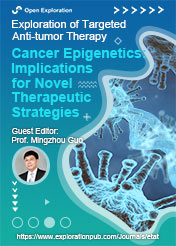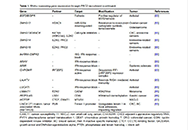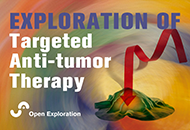
Cancer Epigenetics: Implications for Novel Therapeutic Strategies
Guest Editor
Prof. Mingzhou Guo E-Mail
Professor, Chinese People's Liberation Army (PLA) General Hospital, Dept Gastroenterol & Hepatol, Beijing, China
About the Special lssue
The most common epigenetic markers include DNA methylation, histone modification and non-coding RNA. The cell type-specific expression programs are driven by unique and distinct epigenetic patterns. Beyond helping to understand the disease biology, aberrant epigenetic changes have been applied to cancer detection, prognosis and therapy[1]. The regulators of “epigenetic machinery” are divided into four categories: "writers," responsible for DNA methylation and histone modifications; "erasers," which remove these modifications; "readers," proteins that bind to modifications to facilitate epigenetic effects; and "movers," chromatin-remodeling proteins that move nucleosomes and allow gene transcription. Epigenetic dysregulation has been regarded as a major factor of cancer development. The reversible nature of epigenetic alterations makes them excellent targets for cancer therapy. However, the clinical practice of DNA methyltransferase(DNMT)and histone deacetylase (HDAC) inhibitors is disappointing in solid tumors, and very limited in hematological malignancies. Epigenetic drugs have been tested in combination with chemo, radio, hormonal, immuno (anti-PD1/PDL1), and/or targeting (tyrosine kinase inhibitor) therapies. Although promising results have been achieved, the widespread use of these drugs has been impeded by their toxicity[2, 3]. Deeper understanding the epigenetic regulation of cell fate and DNA damage repair (DDR) signaling pathways will innovate cancer therapy. Beyond BRCA1/2 mutations, “loss of function” caused by aberrant epigenetic changes provides more opportunities for “synthetic lethal” therapeutic strategies[4]. A more precise understanding of the complexity of chromatin and its role in cancer development will lead to novel therapeutics. Targeting RNA modifications is still in its infancy[5]. The dynamic changes and heterogeneity of epigenetic is a challenge for cancer therapy.
Reference
[1] Mondal P, Natesh J, Penta D, Meeran SM. Progress and promises of epigenetic drugs and epigenetic diets in cancer prevention and therapy: A clinical update. Seminars in cancer biology. 2022;83:503-22.
[2] Yan W, Herman JG, Guo M. Epigenome-based personalized medicine in human cancer. Epigenomics. 2016;8(1):119-33.
[3] Cossío FP, Esteller M, Berdasco M. Towards a more precise therapy in cancer: Exploring epigenetic complexity. Current opinion in chemical biology. 2020;57:41-9.
[4] Gao A, Guo M. Epigenetic based synthetic lethal strategies in human cancers. Biomarker research. 2020;8:44.
[5] Berdasco M, Esteller M. Towards a druggable epitranscriptome: Compounds that target RNA modifications in cancer. British journal of pharmacology. 2022;179(12):2868-89.
Keywords: DNA methylation, histone modification, non-coding RNA, synthetic lethal target, cell fate, TET.
Published Articles

